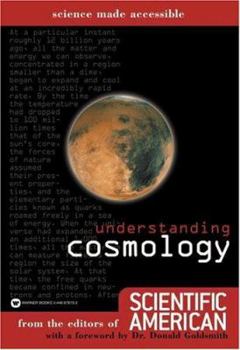Understanding Cosmology
Select Format
Select Condition 
Book Overview
What is the true nature of the universe and its ultimate fate? Drawing on ground-breaking observations, cosmologists have come up with startling theories presented in this collection. Issues expored... This description may be from another edition of this product.
Format:Paperback
Language:English
ISBN:0446678732
ISBN13:9780446678735
Release Date:March 2002
Publisher:Warner Books (NY)
Length:160 Pages
Weight:0.35 lbs.
Dimensions:0.4" x 5.3" x 8.1"
Customer Reviews
1 rating
Could it be that, on some level, quantum cosmology is wright?
Published by Thriftbooks.com User , 15 years ago
"Finally, what I find especially intriguing today is that some astrophysicists and cosmologists are now suggesting that the very structure of physical reality, from the first moments of the cosmic dawn, cannot be adequately understood apart from the eventual emergence of mind. This thinking is known as the Strong Anthropic Principle." John F. Haught, professor of theology,Georgetown University. Defining Cosmology: Cosmology (Gk., kosmos + logos). Reflection on, and account of the world/universe as a meaningful whole, as embodying or expressing an order or underlying structure that makes sense: cosmogony is concerned with the coming into being of the cosmos, and cosmography with the description of its extent. (The Concise Oxford Dictionary of World Religions) Introducing Cosmology: For most of the 20th century, cosmologists held that it began with the Big Bang, the Universe was very hot and extremely dense. The Universe expanded, with space stretching and matter/energy to spread out, the temperature dropped, and everything from atoms to galaxy clusters emerged. The basic theoretical concepts for the development of our Universe, known as the Standard Model of cosmology, undergone overall revision recently, due to precise astronomical measurements, has experienced dramatic changes. Modern cosmology is based on Einstein's fundamental theory of general relativity, which overhauled Newton's mechanical picture of gravitation with a fundamental concept that curvature of space-time causes the force of gravity. So a massive body such as the Earth causes a deformation of space-time. When a second object, such as a meteor, is encountered it moves in a naturally along geodesics in the curved space-time, changing its direction, speed or both. The response of space-time to a massive body and the natural motion of a meteor in Einstein's curved space-time, almost exactly reproduces Newtonian version of gravity. Differences between the two theories are quite small but increase if the curvature of space is great, as is the case near a pulsar or black hole, or if one or both of the gravitationally interacting bodies is moving at speeds approaching that of light. (condensed from Jupiter Scientific Information) Origin of the Universe: It is rare for religions to give a single cosmology or cosmogony purporting to be a description of the origin of the universe, in the way in which a scientific cosmology might aim to give a critically realistic account of the origin and nature of the universe. Religious cosmologies give accounts of origin and nature, but principally in order to display the cosmos as an arena of opportunity; and for that reason, a religion may offer, or make use of, many cosmogonies without making much attempt to reconcile the contradictions between them. The first Genesis Creation account, originally, perhaps suggest that the series of Creation stories in Genesis draws upon the Theban doctrine of Creation in which Amen appears in a series of form




